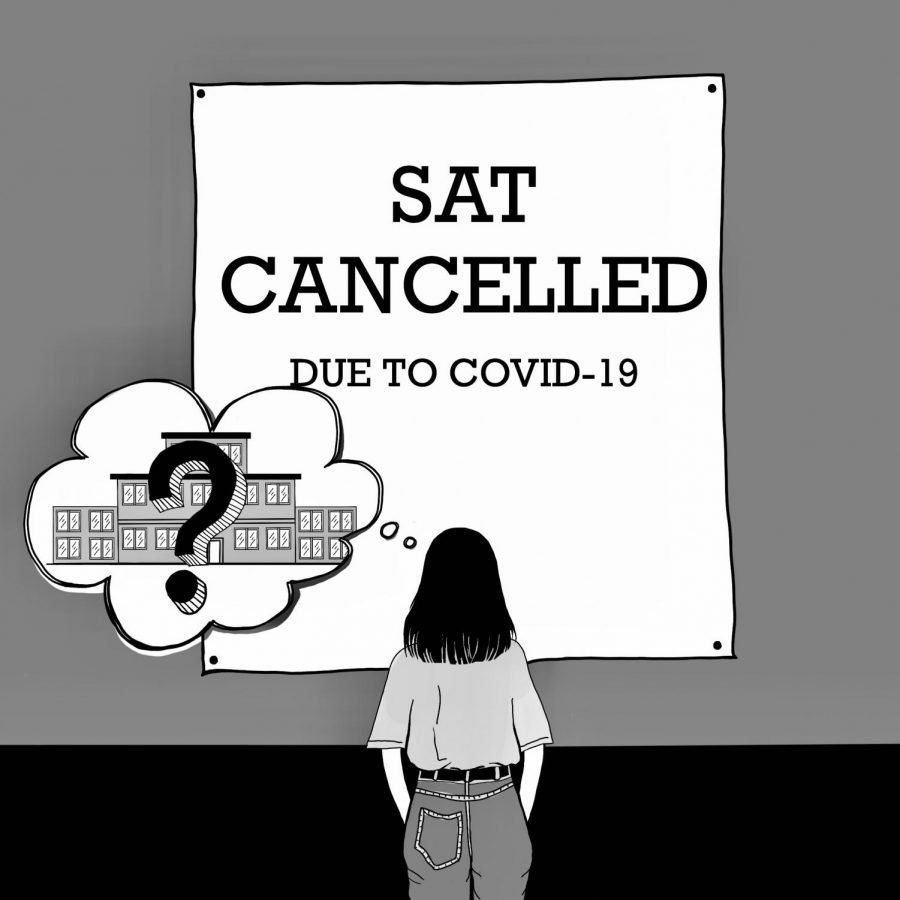Many colleges move to test-optional amidst extended pandemic
Students across the globe were forced to forego sitting for standardized tests due to the COVID-19 pandemic. But what does that mean for students applying to colleges now?
November 4, 2020
Students across the globe study for hours upon hours, and oftentime spend thousands of dollars, preparing to take standardized tests; and, in early March of 2020, thousands of students had been doing just that. Then, the pandemic hit.
The COVID-19 crisis shut down testing for the greater portion of the spring and summer, which prompted colleges and universities to reflect on and rethink their admissions policies and processes, specifically in regards to standardized test scores.
According to Fairtest.org, the National Center for Fair and Open Standardized Testing, there are now over 1,630 institutions across the United States that are test-optional, either temporarily or permanently. There are quite a few schools that already had test-optional policies in place before the pandemic, such as Bowdoin College, the first American college to go test-optional in 1969. But many schools only recently made the switch once it became clear that testing wouldn’t be feasible for a period of time.
When Covid-19 hit the United States in early March, ACT and SAT test dates scheduled for March 14 and March 28 were quickly postponed or canceled. According to Spectrum News New York, the ACT website lists at least 500 testing locations that were closed down because of the pandemic. According to a Tower survey from Oct. 14, over 50 Masters students were unable to sit for their tests because of COVID-19.
Schools like Wake Forest University in Winston-Salem, N.C., and Bard College in Poughkeepsie, N.Y. already had test-optional policies in place and therefore didn’t have to add to their list of variables during this unprecedented time. But schools who greatly emphasized standardized test scores in their admissions process, such as Northeastern University in Boston, Mass., were forced to look in a different direction.
Kyla McNally Anderson, an undergraduate admissions officer at Northeastern University, spoke to Masters’ juniors and seniors on a panel about college admissions and the pandemic. She talked about the emphasis that Northeastern’s previously placed upon standardized test scores and how the pandemic has reshaped their review process.
“Becoming test-optional was a huge move for Northeastern; if anyone is familiar with us, test scores are very important, so it’ll be a challenge, but we’re excited to be taking that on and opening the door of accessibility for our students,” Anderson said.
Masters’ Associate Director of College Counseling Karin Tucker, thinks that moving to a test-optional policy is a necessary decision for all colleges to make, regardless of if test scores were previously emphasized.
“Over half the nation’s colleges and universities have gone test-optional for many reasons, but especially because it’s just unfair to ask students who are living through a global pandemic to take an exam that they can’t even get to,” she said.
Senior Richie Boxer was prepped and ready to take the ACT in August, but when his test date was cancelled, he was forced to start thinking about applying to college without sitting for a test, a part of his application he had been relying on.
“While I think, especially now, it won’t hurt people to not have a test score, it is always a major advantage to have a good score for your applications,” Boxer said.
Tarah Desousa, Media Communications Strategist at ACT, said as the pandemic continues to affect students, the ACT will keep taking the extra steps necessary to make testing during these uncertain times as easy and safe as possible.
“Unfortunately, it’s clear that the pandemic will be with us for some time. We’ll continue to open up as many testing sites and seats as possible, and we’ll be rolling out a remote proctoring option in the coming months that will allow students to take the ACT test online, at home or in other safe and convenient locations. We know that scores from the ACT test are important for students, particularly as they plan their futures at college or in a career setting,” she said.
Colleges and universities have taken the extra step during the pandemic to explicitly declare in their test-optional policies that not providing a test score will not be held against any applicant. According to Private Prep, a tutoring and test prep service, a few schools have even decided to go “test blind” during the pandemic, including Yale University in New Haven, C.T. and Caltech in Pasadena, Calif. Unlike test-optional schools, where submitting test scores is welcome but not required, test blind schools will not consider any standardized test scores at all, whether or not a student submits them.
The director of communications at College Board, the organization that creates SAT tests, Sara Sympson, said she believes that standardized testing is a valuable part of any student’s college application, but understands the extenuating circumstances that leave many students unable to sit for exams this year.
“As schools continue to navigate uncertainties due to the coronavirus, the top priorities for the College Board are the health and safety of students and educators. We’re working to ensure as many students as possible are able to test safely,” Sympson told Tower, in an exclusive interview.
Many seniors this year had no choice but to apply to test-optional schools, which fortunately may not narrow down their choices this year. But, a few seniors had always been planning on applying solely to test-optional schools, and in that case, the choices for them have increased considerably.
Senior Reed Gilmore had planned on applying to only test-optional schools, even before the pandemic struck. He decided he wanted to focus on in-school academics and didn’t consider himself a strong standardized test-taker. Gilmore is looking to be recruited for college soccer, and feels a standardized test score wouldn’t add anything to his applications and recruitment process. Though the pandemic has made it much harder for him to attend clinics and meet with coaches personally, Gilmore is looking forward to putting more schools on his radar now that so many have gone test-optional.
“I was always planning on applying to test-optional schools, but I lucked out with so many more schools becoming test-optional. I expect, or at least hope, tons more colleges become permanently test-optional and review applications more holistically instead of valuing students by a singular test grade,” he said.
Similar to Gilmore’s sentiments, Tucker believes that, with so many schools going test-optional, students applying to colleges can now focus more on their academics and other parts of the college admissions process that they can control.
“We encouraged students to lessen their stress and take this as an opportunity to focus on the important aspects of their application that are in their control.”





